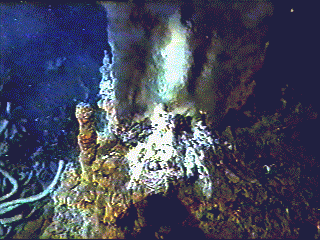jacderida wrote:the known planets is a cool link casio!
i take it by "earth like" they mean planets that have an atmosphere that could sustain human life?
who's to say that some sort of other life form couldn't evolve in conditions that don't provide "carbon dioxide, water and ozone"? i've never really understood that - is there something fundamentally wrong with my question? (i don't know shit about chemistry and biology  )
)
it's basically to do with the properties of water that other substances don't posess and that all known life-forms rely on. some people think silicon-based life might be possible but no-one really knows yet. I copy & pasted this from a website that explains it better than I'm capable of remembering from my own studies! (years ago now)
"The answer involves the need for a solvent to sustain life, if for no other reason than to act as a transport mechanism for fuel (i.e., to carry an energy source throughout the organism, and to help dispose of waste products). There are at least five desirable characteristics of such a solvent, for the purpose of supporting life:
1. It should maintain a liquid state over a wide range of temperatures. That is, the spread between its freezing and its boiling points should be as great as possible. (Water, as you know, remains liquid over a 100-degree C range. That's among the widest liquid-state ranges of known sovents, which seems ideal for the purpose stated.)
2. It should be rather polar. A molecule with a "positive" and a "negative" side can form bonds more easily than an electrically symmetrical one. (Water is indeed quite highly polar.)
3. It should have high surface tension. The ability to glom together in drops, to climb plant stalks through capillary action, and to pool together and flow are all useful for biological processes. (Water does have high surface tension, as you can easily observe any time it is raining.)
4. It should be less dense in the solid than in the liquid state. An ocean that freezes from the bottom up will likely kill all life that may have emerged within it. (Water ice floats on top of liquid water, permitting life to flourish below frozen lakes.)
5. It, or its building materials, should be readily available. (Water is made from hydrogen and oxygen. Hydrogen is the most abundant element in the Universe, and oxygen is right up there among the top ten.) "
you need ozone to prevent radiation from the parent star killing everything before it starts, and carbon dioxide and oxygen go hand-in-hand so plant and animal life sustain each other (we breathe out Carbon Dioxide, they breathe out Oxygen, and same the other way round: we breathe in Oxygen and they breathe in Carbon Dioxide. also why cutting down all the rainforests is a bad idea, they basically manufacture our air supply)
sorry I can't give a better answer as my area was astrophysics, never was much of a chemist or biologist myself either!! (astrobiology now exists as an official field of science by the way!)





